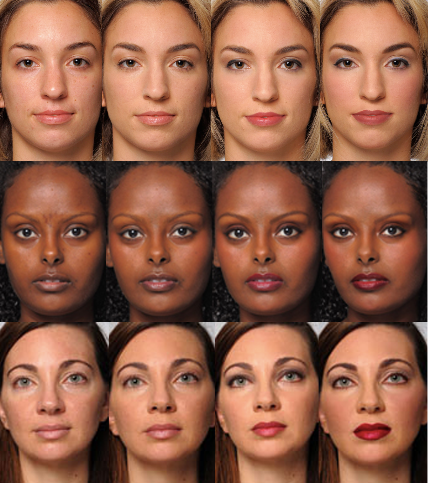In recent times there has been a push for body acceptance, and makeup has been a big part of the discussion. Some women love wearing makeup, and others don’t. So while you should always be making the best decisions for yourself, there is something else going on here. How is your makeup being perceived in the workplace? Is it helping you get ahead, or is it holding you back?

In a 2016 study by Jaclyn S. Wong and Andrew M. Penner published in Research in Social Stratification and Mobility looked at how attractiveness affected income. Their findings confirmed long held beliefs that attractive people, they just make more money. In fact they found that an attractive individual can earn roughly 20% more than an average attractive person. However, makeup has to be added into that equation and the study accounted for ‘grooming’. They found that beauty can be ‘actively cultivated’ which means, yes wearing makeup can help you be seen as more attractive and therefore your salary can reflect that.
Does this mean that men should take ‘grooming’ into account, yes actually. It helps the overall perception of attractiveness and competence, but men aren’t judged nearly as much on that as their female counterparts are. So yes men should be grooming, but it isn’t nearly as important for them as it is for women. Lucky us.
 Competent, trustworthy, approachable? What Do You Think?@malvestida
Competent, trustworthy, approachable? What Do You Think?@malvestida
In a different 2016 Dr. Viktoria Mileva and her team looked at the way makeup was perceived across gender lines with their results published in the aptly named journal, Perception. The study was done using computer software generated standardized makeup looks. Volunteers rated these looks according to attractiveness, dominance, and prestige. This is a clear example of where we can see the gender divide when it comes to opinions of makeup in the workplace.
Men and women both agreed that the makeup wearing faces were more attractive, but when it came to dominance and prestige the opinions differed. Women rated fellow women as more dominant while men rated them as more prestigious. The researchers found it likely that men don’t see women as physical competitors and therefore didn’t rank them as dominant. A follow up study found that the women’s rankings were more based on jealousy, and they saw the made up women as more promiscuous and attractive to men than the non-makeup wearing counterparts.
 Prestigious, in control, untrustworthy? What Do You Think?@malvestida
Prestigious, in control, untrustworthy? What Do You Think?@malvestida
This leads to an interesting dilemma for women in the workplace. How do you do your makeup, for the men or the women in the office? Is it possible to please both? Should you shift your makeup looks depending on the situation? To look at that, there is even more you need to know about office makeup.
A study by Nancy L. Etcoff and her team, published in 2011 here, studied people’s perceptions based on how much makeup a woman was wearing. Offered three looks from bare to heavy makeup the results show how tumultuous the ‘Survival of the Prettiest’ can be. There is no foolproof makeup look, and it has to change based on the situation. Cosmetics can wildly change people’s perception of you from how smart you are, how approachable, how in control, and how competent. Your makeup can make you more attractive, but you could also be perceived as more untrustworthy.
 Who would you hire? Figure 1 – Plos
Who would you hire? Figure 1 – Plos
So really, what does it all mean? Well really it’s good and it’s bad news. It means that at the end of the day, women are judged on their appearance more than men are. It means to get ahead of a man with equal skills, you have to take your physical appearance into account. It means that makeup can help women be perceived as competent put together people, but with the double-edged sword that too much makeup can give you a very different reputation. It means women can use makeup to their advantage while the world uses it as a weapon against them at the exact same time.
string(5547) "
In recent times there has been a push for body acceptance, and makeup has been a big part of the discussion. Some women love wearing makeup, and others don't. So while you should always be making the best decisions for yourself, there is something else going on here. How is your makeup being perceived in the workplace? Is it helping you get ahead, or is it holding you back?

In a 2016 study by Jaclyn S. Wong and Andrew M. Penner published in Research in Social Stratification and Mobility looked at how attractiveness affected income. Their findings confirmed long held beliefs that attractive people, they just make more money. In fact they found that an attractive individual can earn roughly 20% more than an average attractive person. However, makeup has to be added into that equation and the study accounted for 'grooming'. They found that beauty can be 'actively cultivated' which means, yes wearing makeup can help you be seen as more attractive and therefore your salary can reflect that.
Does this mean that men should take 'grooming' into account, yes actually. It helps the overall perception of attractiveness and competence, but men aren't judged nearly as much on that as their female counterparts are. So yes men should be grooming, but it isn't nearly as important for them as it is for women. Lucky us.
 Competent, trustworthy, approachable? What Do You Think?@malvestida
Competent, trustworthy, approachable? What Do You Think?@malvestida
In a different 2016 Dr. Viktoria Mileva and her team looked at the way makeup was perceived across gender lines with their results published in the aptly named journal, Perception. The study was done using computer software generated standardized makeup looks. Volunteers rated these looks according to attractiveness, dominance, and prestige. This is a clear example of where we can see the gender divide when it comes to opinions of makeup in the workplace.
Men and women both agreed that the makeup wearing faces were more attractive, but when it came to dominance and prestige the opinions differed. Women rated fellow women as more dominant while men rated them as more prestigious. The researchers found it likely that men don't see women as physical competitors and therefore didn't rank them as dominant. A follow up study found that the women's rankings were more based on jealousy, and they saw the made up women as more promiscuous and attractive to men than the non-makeup wearing counterparts.
 Prestigious, in control, untrustworthy? What Do You Think?@malvestida
Prestigious, in control, untrustworthy? What Do You Think?@malvestida
This leads to an interesting dilemma for women in the workplace. How do you do your makeup, for the men or the women in the office? Is it possible to please both? Should you shift your makeup looks depending on the situation? To look at that, there is even more you need to know about office makeup.
A study by Nancy L. Etcoff and her team, published in 2011 here, studied people's perceptions based on how much makeup a woman was wearing. Offered three looks from bare to heavy makeup the results show how tumultuous the 'Survival of the Prettiest' can be. There is no foolproof makeup look, and it has to change based on the situation. Cosmetics can wildly change people's perception of you from how smart you are, how approachable, how in control, and how competent. Your makeup can make you more attractive, but you could also be perceived as more untrustworthy.
 Who would you hire? Figure 1 - Plos
Who would you hire? Figure 1 - Plos
So really, what does it all mean? Well really it's good and it's bad news. It means that at the end of the day, women are judged on their appearance more than men are. It means to get ahead of a man with equal skills, you have to take your physical appearance into account. It means that makeup can help women be perceived as competent put together people, but with the double-edged sword that too much makeup can give you a very different reputation. It means women can use makeup to their advantage while the world uses it as a weapon against them at the exact same time.
"



 Competent, trustworthy, approachable? What Do You Think?@malvestida
Competent, trustworthy, approachable? What Do You Think?@malvestida Prestigious, in control, untrustworthy? What Do You Think?@malvestida
Prestigious, in control, untrustworthy? What Do You Think?@malvestida Who would you hire? Figure 1 – Plos
Who would you hire? Figure 1 – Plos









